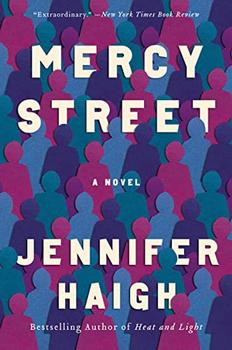Summary | Excerpt | Reviews | Beyond the Book | Readalikes | Genres & Themes | Author Bio

A Novel
by Jennifer Haigh
Her first call was a Pill question. As the caller spoke, Claudia took the following notes: Started pack three days late. Missed two white, took week two. Missed one pink. Only green left.
She had long since mastered the Pill question, having heard every possible variation: started late, started early, vomited up a white one, took two pink ones by mistake. She could answer a Pill question in under a minute, in English, Spanish, or Haitian Creole.
"You'll need to use a backup method," she said. "Condoms for the rest of your cycle."
The caller was unhappy to hear this. No one was ever happy to hear this.
"It's those white pills I'm worried about. Unless you take them consistently the first week, you're not protected."
The moment she disconnected, the line rang again.
The second caller gave her name, Tara. In the background a television was playing. Claudia recognized the opening music of Dr. Phil, the Texas twang of the doctor himself, testifying like a revival-tent preacher: This is going to be a changing day in your life.
"What was the first day of your last menstrual period?" Claudia asked.
Tara was nine weeks pregnant, HIV positive, and sleeping on a stranger's couch. She took methadone, but not regularly, lithium, but not recently. She lit cigarettes one after the other—scratch, pause, inhale. At ten o'clock on a Wednesday morning, she was already high. As she spoke, Claudia thought of the word problems she'd solved in high school algebra, trains traveling at different speeds, in opposite directions. How long before their paths intersect? The problem, always, was knowing which variable to solve for. Tara's life was a burning building with a fire on each floor. Which fire did you put out first?
Tara had only one question.
"Six hundred fifty dollars," said Claudia.
You put out the pregnancy first.
WHAT WOULD BECOME OF TARA? CLAUDIA WOULD NEVER KNOW. The hotline was a portal into a stranger's life: ambient traffic and distant sirens, kids playing in English or Spanish or Portuguese or Hmong. Music playing, a dog barking, a child crying. A video game that must have been popular because she kept hearing it—the catchy electronic jingle, the cartoon gunfire with its plosive reports.
A dog crying, a child barking. Running water, dishwashing, ice cubes tinkling in a glass. Always there was a television. Even in the throes of a personal crisis, it didn't occur to the caller to turn off the TV.
Some counselors found the noise distracting. Claudia barely noticed it, having grown up in such a household. Her mother, Deb, had been a nurse's aide at the county retirement home. She came home from work exhausted and often in physical pain, and the first thing she did, always, was turn on the TV and light a cigarette, her reward for getting through the day.
That's what they called it—the County Home—which sounded nicer than what it really was: a place for indigent old people to grow older and eventually die, a process that sometimes took forever and sometimes only seemed to.
For most of Claudia's childhood, they lived in a single-wide trailer. Not a double-wide. If you know anything at all about mobile homes, you know that the difference is profound. A double-wide feels like a house because of the way it's constructed, in two separate halves that are bolted together on-site. A single is all one piece, like a shipping container, and like a shipping container it gets hot in summer and cold in winter. In a Maine winter it gets very cold, and a crying child produces a strange echo; it's impossible to forget, ever, that you're living in a can. On the plus side, a single is cheap and easy to get. Claudia's mother bought theirs at an RV lot—no mortgage, no credit check. She hauled it away herself, hitched to a truck her brother had "borrowed" from work.
Excerpted from Mercy Street by Jennifer Haigh. Copyright © 2022 by Jennifer Haigh. Excerpted by permission of Ecco. All rights reserved. No part of this excerpt may be reproduced or reprinted without permission in writing from the publisher.
Your guide toexceptional books
BookBrowse seeks out and recommends the best in contemporary fiction and nonfiction—books that not only engage and entertain but also deepen our understanding of ourselves and the world around us.